一般过去时用法及结构
一般过去时的用法及结构

一般过去时的用法及结构1.一般过去时的基本用法一般过去时表示过去某个时间发生的动作或存在的状态,也可表过去经常或反复发生的动作。
常和过去的时间状语连用,如yesterday, last week, last night, in 2003, two days ago等。
【举例】I _____________________ at 6:30 yesterday. 我昨天6:30起床。
My father____________ very busy last week. 我父亲上周很忙。
2.一般过去时的基本结构⑴肯定句“主语+动词过去式+其他”或者“主语+wa s/were+其他”。
【举例】I _____________ tennis last weekend. 我上周末打网球了。
⑵否定句“主语+didn’t+动词原形+其他”或“主语+wasn’t/were n’t+其他”。
The girl _____ _____ computer games yesterday afternoon. 这个女孩昨天下午没玩电子游戏。
Old Henry _______ happy last Friday. 上星期五老亨利不高兴。
⑶一般疑问句“Did+主语+动词原形+其他?”肯定回答为“Yes,主语+did”,否定回答为“No,主语+didn’t”或者“Was/Were+主语+其他?”肯定回答为“Yes,主语+wa s /were”,否定回答为“No,主语+wasn’t/were n’t”。
【举例】—Did you go to the beach? 你们去海滩了吗?—Yes, we did./No, we did n’t. 是的,我们去了。
/不,我们没有。
—Was your weekend OK? 你的周末过得还行吧?—Yes, it was./No, it wasn’t. 是的,还行。
/不,不行。
⑷特殊疑问句:特殊疑问词+一般疑问句(顺序)?【举例】—What _______Li Lei __________ last weekend? 李雷上周末干什么了?—He _____________ his grandparents. 他去看了他的祖父母。
一般过去时规则及例子

一般过去时规则及例子
一般过去时表示过去某个时间里发生的动作或状态;过去习惯性、经常性的动作、行为;过去主语所具备的能力和性格。
基本结构:主语+谓语(动词过去式)+句子其他成分;主语+was/were+形容词/名词/介词短语+过去时间;否定形式①was/were+not;②在行为动词前加didn't,同时还原行为动词;一般疑问句Did+主语+do+其他。
一般过去时,表示过去某个时间里发生的非持续性动作或存在的状态,也表示经常或反复发生的动作。
用动词的过去式表示,常和表示过去的时间状语连用,例如:yesterday,last night,in+过去的年份,two days ago,before,the age of,the day before yesterday 等。
一般过去时也表示过去经常或反复发生的动作,常和often,always 等表示频率的时间状语连用。
表示过去习惯性、经常性的动作、行为;过去主语所具备的能力和性格。
一般过去时态的定义结构和用法
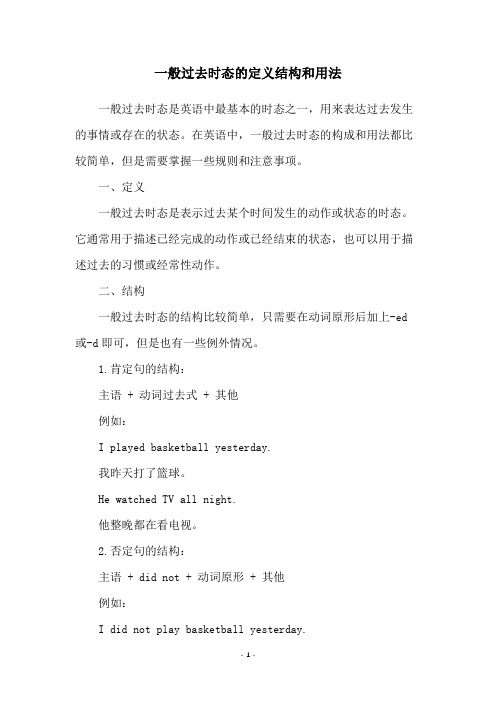
一般过去时态的定义结构和用法一般过去时态是英语中最基本的时态之一,用来表达过去发生的事情或存在的状态。
在英语中,一般过去时态的构成和用法都比较简单,但是需要掌握一些规则和注意事项。
一、定义一般过去时态是表示过去某个时间发生的动作或状态的时态。
它通常用于描述已经完成的动作或已经结束的状态,也可以用于描述过去的习惯或经常性动作。
二、结构一般过去时态的结构比较简单,只需要在动词原形后加上-ed 或-d即可,但是也有一些例外情况。
1.肯定句的结构:主语 + 动词过去式 + 其他例如:I played basketball yesterday.我昨天打了篮球。
He watched TV all night.他整晚都在看电视。
2.否定句的结构:主语 + did not + 动词原形 + 其他例如:I did not play basketball yesterday.我昨天没有打篮球。
He did not watch TV all night.他整晚都没有看电视。
3.疑问句的结构:Did + 主语 + 动词原形 + 其他?例如:Did you play basketball yesterday?你昨天打篮球了吗?Did he watch TV all night?他整晚都在看电视吗?4.特殊情况:有些动词的过去式并不是加-ed或-d,需要特别记忆,例如:go → wentcome → camesee → saweat → ate三、用法一般过去时态的用法比较广泛,主要包括以下几个方面:1.表示过去的动作或状态例如:I visited my grandparents last week.我上个星期去看了我的祖父母。
She was very happy when she got the news.她得知这个消息时非常开心。
2.表示过去的经常性动作或习惯例如:When I was a child, I always played with my friends after school.当我还是个孩子的时候,放学后我总是和我的朋友一起玩。
一般过去时的用法及结构

一般过去时的用法及结构1.表示过去的习惯或经常性的动作:- Every day, he walked to school. (每天他步行去上学。
)- She often played the piano in the evening. (她经常在晚上弹钢琴。
)- They always visited their grandparents on Sundays. (他们每个星期天总是去看望他们的祖父母。
)2.表示过去具体的、已经完成的动作:- I finished my homework last night. (昨晚我完成了我的作业。
) - He went to the cinema yesterday. (他昨天去了电影院。
)- She cooked a delicious dinner for us. (她为我们做了一顿美味的晚餐。
)3.表示过去进行的动作:- They were playing football in the park. (他们正在公园里踢足球。
)- She was reading a book on the sofa. (她正坐在沙发上读书。
)4.表示过去存在的状态或属性:- It was a sunny day yesterday. (昨天是个晴朗的日子。
)- The house was old and small. (这房子又旧又小。
)- He was happy when he heard the good news. (当他听到那个好消息时他很高兴。
)5.在宾语从句中,表示间接引语的动作或说话:- He said he loved me. (他说他爱我。
)- She told us she was going to travel. (她告诉我们她要去旅行。
)- They asked if I had seen the movie. (他们问我是否看过那部电影。
)需要注意的是,一般过去时经常与表示过去的时间状语连用,如yesterday(昨天)、last night(昨晚)、two years ago(两年前)等。
一般过去时的用法

一般过去时一、一般过去时的基本用法一般过去时表示过去某一时候或某一段时间所发生了的事情或存在的状态,常与过去时间状语连用。
二、一般过去时的时间状语①与yesterday连用的时间,例如,yesterday,yesterday evening,the day before yesterday,等②与last连用的时间,即last+时间,例如last night, last week③与ago连用的时间,即时间+ago,例如 a moment ago.three days ago④in+过去时间,例如in 1998, in 2000⑤表示过去的时间just now,this morning, once upon a time,the other day,at the age of+过去的年龄,at that time, at that moment等三、一般过去时的结构1、肯定形式:① be动词:主语+was/were+其他eg:i was very busy yesterday.②行为动词:主语+动词过去式+其他eg:i played football yesterday.2、否定形式:①主语+was/were+not+其他eg:i was not busy yesterday.②主语+didn’t+动词原形+其他eg:i didn’t play football yesterday.3、一般疑问句:① was/were+主语+其他?eg: were you busy yesterday?② Did +主语+动词原形+其他? eg: did you play football yesterday?4、特殊疑问句:特殊疑问词+一般疑问句四、动词过去时动词变化规则。
一般过去时用法及结构

一般过去时用法及结构1、一般过去时的用法及结构1.一般过去时的基本用法一般过去时表示过去某个时间发生的动作或存在的状态,也可表示过去常常或反复发生的动作。
常和表示过去的时间状语连用,如yesterday, last week, last night, in 2021, two days ago等。
【举例】I got up at 6:30 yesterday. 我昨天6:30起床。
My father was very busy last week. 我父亲上周很忙。
2.一般过去时的基本结构⑴确定句“主语+动词过去式+其他”或者“主语+was/were+其他”。
【举例2、】I played tennis last weekend. 我上周末打网球了。
My school trip was great. 我的学校郊游棒极了。
⑵否认句“主语+didn’t+动词原形+其他”或“主语+wasn’t/weren’t+其他”。
【举例】The girl didn’t play computer games yesterday afternoon . 这个女孩昨天下午没玩电子游戏。
Old Henry wasn’t happy last Friday. 上星期五老亨利不高兴。
⑶一般疑问句“Did+主语+动词原形+其他?”确定回答3、为“Yes,主语+did”,否认回答为“No,主语+didn’t”或者“Was /Were+主语+其他?”确定回答为“Yes,主语+was/were”,否认回答为“No,主语+wasn’t/weren’t”。
【举例】—Did you go to the beach? 你们去海滩了吗?—Yes, we did./No, we didn’t.是的,我们去了。
/不,我们没有。
—Was your weekend OK? 你的周末过得还行吧?—Yes, it was./No, it wasn’t.是的,还行。
一般过去时用法和结构

一般过去时用法和结构一般过去时,那可真是英语时态里的一个“小机灵鬼”呢!一般过去时就是用来描述过去某个时间里发生的动作或者状态。
比如说,I went to the park yesterday.(我昨天去公园了)。
这里的“went”就是“go”的一般过去式,很明显是发生在昨天这个过去的时间里的动作。
在结构上呀,如果是be动词,那就是主语+was/were+其他。
像He was at home last night.(他昨晚在家)。
要是实义动词呢,就是主语+动词的过去式+其他。
就像She played basketball last week.(她上周打篮球了)。
动词的过去式可有意思啦,有些是规则变化,就像直接加 -ed 的,像work变成worked;还有以e结尾的直接加 -d,比如like 变成liked。
但也有调皮的不规则变化,像go变成went,eat变成ate。
这就像是每个动词都有自己独特的小脾气一样。
我们在日常生活里经常会用到一般过去时呢。
当你和朋友聊天,说I saw a really cute dog on my way to school this morning.(我今天早上上学路上看到一只超可爱的狗),这就是在分享过去发生的事情呀。
又或者当你在讲述自己的经历,比如I visited my grandparents last month.(我上个月去看望我的爷爷奶奶了)。
它就像是一把钥匙,能打开我们过去的记忆盒子,把那些有趣的、难忘的事情分享出来。
而且在故事里,一般过去时也是常客。
比如The little boy ran away from home yesterday.(小男孩昨天离家出走了),这一下子就能把我们带入到故事的情节当中去。
我们在学英语的时候,可不能小瞧一般过去时哦。
要是用错了,那可就像把衣服穿反了一样别扭。
它能让我们准确地传达过去的信息,让别人能清楚地了解我们想要分享的过去的事情。
6一般过去时的用法及结构

一般过去时1.一般过去时的基本用法一般过去时表示过去某个时间发生的动作或存在的状态。
常和表示过去的时间状语连用,如yesterday, last week, last night, in 2003, two days ago等。
【举例】I got up at 6:30 yesterday. 我昨天6:30起床。
My father was very busy last week. 我父亲上周很忙。
2.一般过去时的基本结构⑴肯定句“主语+动词过去式+其他”或者“主语+wa s/were+其他”。
【举例】I played basketball last weekend. 。
My school trip was great.⑵否定句“主语+didn’t+动词原形+其他”或“主语+wasn’t/were n’t+其他”。
【举例】The girl didn’t play computer games yesterday afternoon .Bob wasn’t happy last Friday.⑶一般疑问句“Did+主语+动词原形+其他?”肯定回答为“Yes,主语+did”,否定回答为“No,主语+didn’t”或者“Was/Were+主语+其他?”肯定回答为“Yes,主语+wa s/were”,否定回答为“No,主语+wasn’t/were n’t”。
【举例】—Did you go to the beach? \—Yes, we did./No, we did n’t. \—Was your weekend OK? \—Yes, it was./No, it wasn’t. \⑷特殊疑问句:特殊疑问词+一般疑问句(顺序)?【举例】—What did Li Lei do last weekend?—He visited his grandparents.——Where were you yesterday?——I was at home.过去式的构成be动词和实义动词过去式的构成:⑴系动词be 的过去式有两种形式:was 和were。
一般过去时态的结构和用法表格
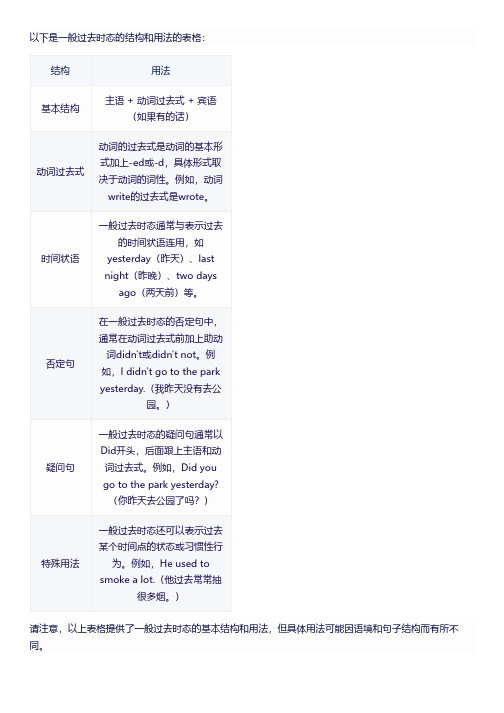
以下是一般过去时态的结构和用法的表格:结构用法
基本结构主语 + 动词过去式 + 宾语(如果有的话)
动词过去式动词的过去式是动词的基本形式加上-ed或-d,具体形式取决于动词的词性。
例如,动词write的过去式是wrote。
时间状语一般过去时态通常与表示过去的时间状语连用,如yesterday(昨天)、last night(昨晚)、two days ago(两天前)等。
否定句在一般过去时态的否定句中,通常在动词过去式前加上助动词didn't或didn't not。
例如,I didn't go to the park yesterday.(我昨天没有去公
园。
)
疑问句一般过去时态的疑问句通常以Did开头,后面跟上主语和动词过去式。
例如,Did you go to the park yesterday?(你昨天去公园了吗?)
特殊用法一般过去时态还可以表示过去某个时间点的状态或习惯性行为。
例如,He used to smoke a lot.(他过去常常抽
很多烟。
)
请注意,以上表格提供了一般过去时态的基本结构和用法,但具体用法可能因语境和句子结构而有所不同。
一般过去时的用法及结构笔记

一般过去时的用法及结构笔记(实用版)目录I.一般过去时简介1.时间含义2.结构特点II.一般过去时的结构1.动词变化规则2.其他语法规则III.一般过去时在句子中的使用1.陈述句2.疑问句3.否定句IV.一般过去时与其它时态的比较1.现在完成时2.过去完成时3.将来时正文一、一般过去时简介一般过去时是一种表示过去某个时间点发生过的事情的时态。
它强调的是过去某个时间点,而非持续性的动作或状态。
在中文中,一般过去时通常使用“了”来表示。
例如,“我昨天去了公园。
”这句话就使用了“了”来表示发生在昨天的一个动作。
二、一般过去时的结构一般过去时的结构包括动词的变化和其他语法规则。
1.动词变化规则:一般过去时通常使用动词原形,没有加-ed或-ing 的形式。
例如,“I walked to school yesterday.”中的“walked”就是动词原形,没有加-ed的形式。
2.其他语法规则:一般过去时还涉及到一些其他的语法规则,例如时间状语的用法、否定句和疑问句的构造等。
例如,“I didn"t watch the movie yesterday.”中的“watch”是动词,没有加-ed的形式,表示在过去某个时间点发生的一个动作。
三、一般过去时在句子中的使用一般过去时在句子中可以用来表达陈述、疑问、否定等含义。
例如,“I had a great time yesterday.”这句话就是一个陈述句,表示“我”在过去某个时间点度过了一段美好的时光。
而“Did you watch the game yesterday?”则是一个疑问句,表示“你”是否观看了比赛。
而“I didn"t finish my homework.”则是一个否定句,表示“我”没有完成作业。
四、一般过去时与其它时态的比较一般过去时与其它时态相比较,有以下几种比较:1.与现在完成时比较:现在完成时强调的是过去的动作对现在造成的影响和结果,而一般过去时则没有这个含义。
一般过去时的用法及结构

般过去时的用法及结构 1 . 一般过去时的基本用法 一般过去时表示过去某个时间发生的动作或存在的状态, 作。
常和表示过去的时 yesterday, last week, last night, in 2003, two days ago 【举例】 I gotup at 6:30 yesterday. 我昨天 6:30 也可表示过去经常或反复发生的动 间 状 语 连 用 , 如 等。
起床。
My father was very busy last week. 我父亲上周很忙。
2 . 一般过去时的基本结构 ⑴ 肯定句“主语+动词过去式+其他”或者“主语+ was / were +其他”。
【举例】 I played tennis last weekend. 我上周末打网球了。
My school trip was great. 我的学校郊游棒极了。
⑵ 否定句“主语+ didn 't +动词原形+其他”或“主语+ wasn 't /weren 't +其他”。
【举例】 The girl didn ' t play computer games yesterday afternoon. 这个女孩昨天下午没玩电子游戏。
' t happy last Friday. 上星期五老亨利不高兴。
Did +主语+动词原形+其他?” Old Henry wasn ⑶ 一般疑问句“ 肯定回答为 否定回答为 肯定回答为 否定回答为 【举例】— Yes ,主语+ did ”, No ,主语+ didn ' t ”或者“ Was /Were +主语+其他?” Yes ,主语+ was / were ”, No ,主语+ wasn 't /weren 't ”。
你们去海滩了吗? Did you go to the beach?— Yes, we did. /No, we didn— Was your weekend OK? — Yes, it was. / No, it wasn ⑷ 特殊疑问句:特殊疑问词+一般疑问句(顺序)? t. 是的,我们去了。
一般过去时的用法
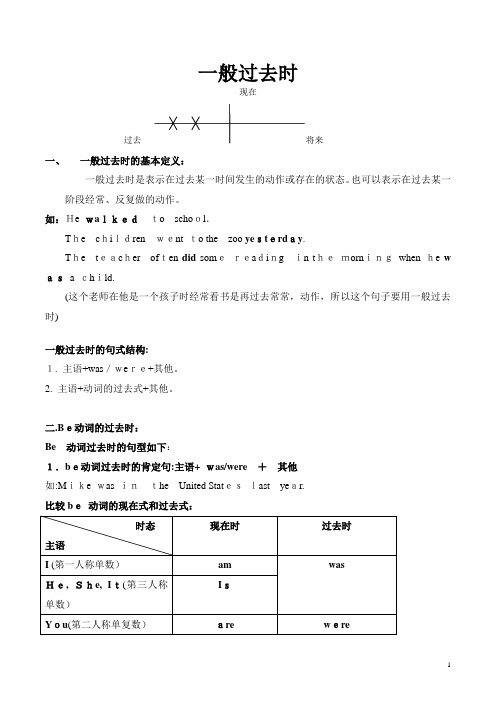
一般过去时现在过去将来一、 一般过去时的基本定义:一般过去时是表示在过去某一时间发生的动作或存在的状态。
也可以表示在过去某一阶段经常、反复做的动作。
如:He wa lked to scho ol .T he c hi ldren went to the zoo ye st erd ay .T he t eac her of ten did som e rea di ng in t he morn ing when he w as a ch ild.(这个老师在他是一个孩子时经常看书是再过去常常,动作,所以这个句子要用一般过去时)2. 主语+动词的过去式+其他。
二.B e动词的过去时: Be 动词过去时的句型如下:1.b e动词过去时的肯定句:主语+ was/were + 其他 如:M ike was in the United Stat es last ye ar. 比较b e 动词的现在式和过去式: 一般过去时的句式结构: 1. 主语+was /we re+其他。
如:Iwasvery tiredlast night.Youwere absentfrom school two daysago.There weresome booksthere. (那儿曾经有一些书。
)注意:Therebe句型用于一般过去时需把is/are 变为它们的过去式:There was (were) …2. Be动词过去时的否定句:主语+was/were+not+其他He wasnot inCanadalast year.Be 过去式的否定句结构,只要在was/were后面加上not 就可以了。
它的缩写形式为:wasn’t 和weren’t如:Iwasn’tbusy yesterday.There weren’t any boys in the room.3. Be动词过去时的疑问句:(1)was/were+ 主语+其他(一般疑问句)----Wasit rainingin Beijingyesterday?----No,itwasn’t. It was cloudy.(2)特殊疑问词+were/was+主语+其他(特殊疑问句)----Where were youyesterdaymorning?----I was atschool.Be动词过去式一般疑问句的结构,只要把was/were 提到主语前面,some变any ,and变成or.回答时,Yes, … was/were.No, … wasn’t/weren’t.以疑问词开始的特殊疑问句,回答时,不能用Yes, No.直接回答所问的问题即可。
初中一般过去时态的结构和用法
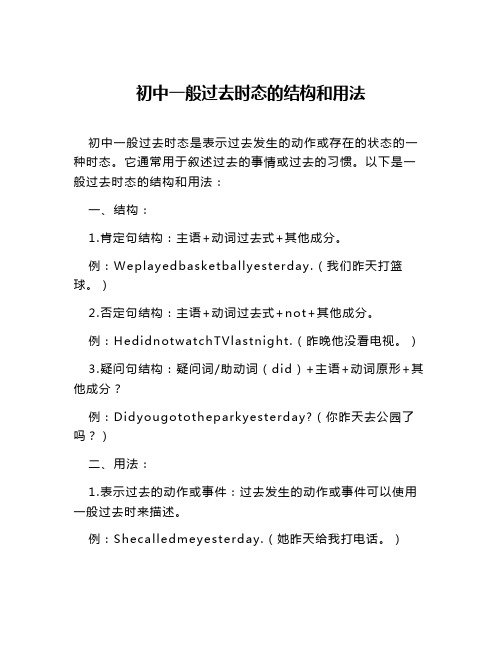
初中一般过去时态的结构和用法初中一般过去时态是表示过去发生的动作或存在的状态的一种时态。
它通常用于叙述过去的事情或过去的习惯。
以下是一般过去时态的结构和用法:一、结构:1.肯定句结构:主语+动词过去式+其他成分。
例:Weplayedbasketballyesterday.(我们昨天打篮球。
)2.否定句结构:主语+动词过去式+not+其他成分。
例:HedidnotwatchTVlastnight.(昨晚他没看电视。
)3.疑问句结构:疑问词/助动词(did)+主语+动词原形+其他成分?例:Didyougototheparkyesterday?(你昨天去公园了吗?)二、用法:1.表示过去的动作或事件:过去发生的动作或事件可以使用一般过去时来描述。
例:Shecalledmeyesterday.(她昨天给我打电话。
)2.表示过去的习惯或状态:过去经常或习惯性发生的动作可以使用一般过去时来表示。
例:Iusedtoplaysoccerwithmyfriendsafterschool.(我过去放学后常常和朋友们一起踢足球。
)3.与时间状语连用:一般过去时通常与表示过去时间的时间状语连用,如yesterday(昨天)、lastnight(昨晚)、twoyearsago(两年前)等。
例:Theyvisitedthemuseumlastweek.(他们上周参观了博物馆。
)需要注意的是,一般过去时态中动词的变化规则如下:1.一般动词的过去式一般直接在原形后面加ed。
例:work→worked(工作→工作过)2.以不发音的字母e结尾的动词,只需加d。
例:dance→danced(跳舞→跳舞过)3.以辅音字母+y结尾的单词,变y为i并加ed。
例:study→studied(学习→学习过)4.以一个元音字母加上辅音字母结尾,且为重读闭音节的动词,双写结尾的辅音字母,并加ed。
例:stop→stopped(停止→停止过)总的来说,一般过去时态是初中英语中常用的一种时态,用来描述过去发生的事情、过去的习惯或状态,常与表示过去时间的时间状语连用。
一般过去时的用法和结构

一般过去时的用法和结构一、肯定句的结构:主语+动词过去式(不规则动词根据变化规则)+其他成分例如:- I played basketball yesterday.(我昨天打篮球。
)- He cleaned his room last night.(他昨晚打扫了他的房间。
)二、否定句的结构:主语 + 助动词did(一般过去时助动词)+ not + 动词原形 + 其他成分例如:- I did not play basketball yesterday.(我昨天没有打篮球。
)- He did not clean his room last night.(他昨晚没有打扫他的房间。
)三、疑问句的结构:助动词did(一般过去时助动词)+ 主语 + 动词原形 + 其他成分例如:- Did you play basketball yesterday?(你昨天打篮球了吗?)- Did he clean his room last night?(他昨晚打扫了他的房间吗?)1.表示过去的经历或经验:- I lived in London for five years.(我在伦敦生活了五年。
)- She visited Paris last summer.(她去年夏天去了巴黎。
)2.表示过去的习惯或常常发生的动作:- He always drank coffee in the morning.(他过去常在早上喝咖啡。
)- We often played soccer on weekends.(我们过去经常在周末踢足球。
)3.表示过去的条件或假设:- If I had enough money, I would have bought a new car.(如果我有足够的钱,我就会买一辆新车。
)- I wish I knew the answer.(我希望我知道答案。
)4.表示过去的状态或属性:- The weather was sunny yesterday.(昨天天气晴朗。
一般过去时的用法及结构
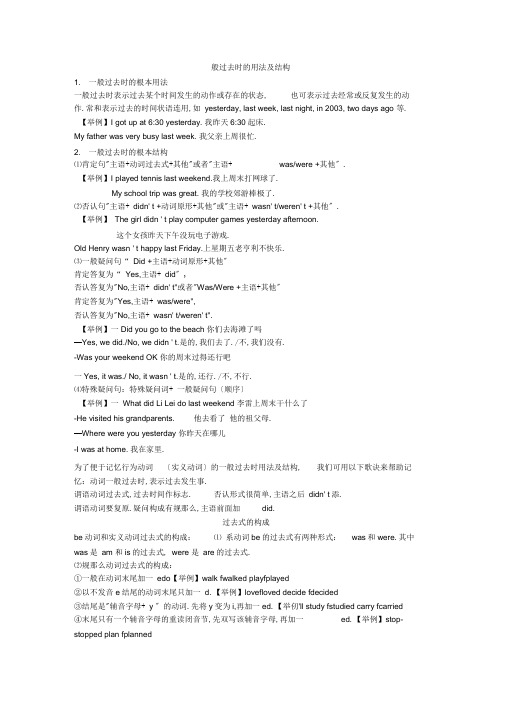
般过去时的用法及结构1. 一般过去时的根本用法一般过去时表示过去某个时间发生的动作或存在的状态, 也可表示过去经常或反复发生的动作.常和表示过去的时间状语连用,如yesterday, last week, last night, in 2003, two days ago 等.【举例】I got up at 6:30 yesterday. 我昨天6:30起床.My father was very busy last week. 我父亲上周很忙.2. 一般过去时的根本结构⑴肯定句"主语+动词过去式+其他"或者"主语+ was/were +其他〞.【举例】I played tennis last weekend.我上周末打网球了.My school trip was great. 我的学校郊游棒极了.⑵否认句"主语+ didn' t +动词原形+其他"或"主语+ wasn' t/weren' t +其他〞.【举例】The girl didn ' t play computer games yesterday afternoon.这个女孩昨天下午没玩电子游戏.Old Henry wasn ' t happy last Friday.上星期五老亨利不快乐.⑶一般疑问句“ Did +主语+动词原形+其他〞肯定答复为“ Yes,主语+ did〞,否认答复为"No,主语+ didn' t"或者"Was/Were +主语+其他〞肯定答复为"Yes,主语+ was/were",否认答复为"No,主语+ wasn' t/weren' t".【举例】一Did you go to the beach 你们去海滩了吗—Yes, we did./No, we didn ' t.是的,我们去了./不,我们没有.-Was your weekend OK 你的周末过得还行吧一Yes, it was./ No, it wasn ' t.是的,还行./不,不行.⑷特殊疑问句:特殊疑问词+ 一般疑问句〔顺序〕【举例】一What did Li Lei do last weekend 李雷上周末干什么了-He visited his grandparents. 他去看了他的祖父母.—Where were you yesterday 你昨天在哪儿-I was at home. 我在家里.为了便于记忆行为动词〔实义动词〕的一般过去时用法及结构, 我们可用以下歌诀来帮助记忆:动词一般过去时,表示过去发生事.谓语动词过去式,过去时间作标志. 否认形式很简单,主语之后didn' t添.谓语动词要复原.疑问构成有规那么,主语前面加did.过去式的构成be动词和实义动词过去式的构成:⑴ 系动词be的过去式有两种形式:was和were.其中was是am 和is的过去式, were 是are的过去式.⑵规那么动词过去式的构成:①一般在动词末尾加一edo【举例】walk fwalked playfplayed②以不发音e结尾的动词末尾只加一d.【举例】lovefloved decide fdecided③结尾是"辅音字母+ y 〞的动词.先将y变为i,再加一ed.【举仞'll study fstudied carry fcarried④末尾只有一个辅音字母的重读闭音节,先双写该辅音字母,再加一ed.【举例】stop-stopped plan fplanned规那么动词的过去式构成方法可用以下口诀来记忆:过去式构成有规律,一般词尾加一ed如果词尾有个e 〔不发音的〕,只需直接加上一d. “辅音字母+ y 〞在词尾,变y为i加一ed.“一辅重闭〞作尾巴,双写之后加一ed.随堂练习:一.写出以下动词的过去式./is _________ ___________ _____________ ____________'t 6. aren' t二.用适当的词完成以下对话.1.— How was your weekend — It great.一What _ you_ last weekend — I _ some homework.to the beach.2. 一What last weekend She3. —What —___ they do last weekend —They ___ ___ to the movies.三.用括号内所给词的适当形式填空.1. We(enjoy) ourselves at the party last night.(study) for the English test last Sunday.you(go) to the Great Wall last year4. What day(be) it yesterdayold man(be)ill and went to see a doctor.(have) a party last night.(visit) the museum and went home.8.— How(be) the students — They were very friendly.often(have) supper at home. Today he(have) supper at school.had great fun(play) in the water.made me(feel) very happy.12.-he(have) lunch at nine — No, he didn ' t.(buy) a guitar yesterday.四.句型转换.1. He came here last month.(改为否认句)He here last month.1.1. hey played football this morning.(改为一般疑问句并作简略答复)一they football this morning —Yes, they./ No, they.3 .They went to Beijing last year.(就划线局部提问)they last year.4 .Tom watched TV last night.(改为一般疑问句)Tom TV last night5 .Mary does homework every day.(用last night 改写句子)Mary.般现在时的用法与结构1、一般现在时的定义及构成一般现在时表示现在经常反复发生的动作、存在的状态或习惯性的动作.〔1〕 be〔am,is,are〕动词:〔作谓语动词时〕肯定句:主语+be动词〔am,is,are〕+其它.如:①I am a student.〔主语+be动词+名词〕②They are hungry.〔主语+be动词+形容词〕③He is out.〔主语+be动词+副词〕④That pen is mine.〔主语+be动词+ 代词〕⑤I am fifteen.〔主语+be动词+数词〕⑥The bike is under the tree.〔主语+be动词+H司短语〕运用am,is,are写三个句子否认句:主语+ be〔am,is,are〕 + not +其它.如:He is not a worker.他不是工人. 运用am,is,are 写三个句子一般疑问句:Be〔am,is,are〕 +主语+其它.如:-Are you a student -Yes. I am. / No, I'm not.运用am,is,are 写三个句子特殊疑问句:疑问词+一般疑问句.如:Where is my bike 运用am,is,are 写三个句子特殊疑问句:疑问词〔what, where, who, when, which, whose, how, how many, how much, what shape,what colour,〕,找句子中有没有be动词〔is, am或者are〕或情态动词或者助动词〔特殊疑问句:疑问词+be动词〔is, am或者are〕或情态动词或者助动词+其他〕〔2〕行为动词:主语+ 行为动词+ 〔其它〕.〔作谓语动词时〕1〕主语不是第三人称单数时,肯定句为:主语+动词原形+其它否认式为:主语+don't+动词原形+其它疑问句为:Do+主语+动词原形+其它. ① We speak Chinese.②Do you speak Chinese ---Yes, I do. / No, I don't.③They don't speak Chinese.写三个句子2〕当主语是第三人称单数时:〔he,she,it,A/An,单独的人或事物:Lily/book〕肯定句为:主语+动词〔词尾加s或es〕 +其它.否认式为:主语+doesn't+动词原形+其它.疑问句式:Does+主语+动词原形+其它①He speaks English.②He doesn't speaks English.③-Does she go to work by bike Yes, she does. / No, she doesn't.写三个句子特殊疑问句:疑问词+一般疑问句.如:How does your father go to work3〕动词+s的变化规那么〔1〕一般情况下,直接加-s,如:cook-cooks, milk-milks〔2〕以s. x. sh. ch. o 结尾,力口-es, 如: guess-guesses, wash-washes, watch-watches, go-goes 〔3〕以"辅音字母+y"结尾,变y为i,再加-es,如:study-studies〔3〕情态动词〔作谓语动词时〕〔can,could,be able to,may,might,must,have to,need,shall,should, will,would〕时,句子结构为:肯定句:主语+情态动词+动词原形.否认句:主语+情态动词+not+动词原形一般疑问句;情态动词+主语+动词原形+其他特殊疑问句:疑问词+情态动词+主语+动词原形+其他Eg:① He can speak English.② Can I help you What can I do for you在实际应用中,一般现在时常与以下时间状语联用:always, usually, often, sometimes, every week (day, year, month …), once a week, on Sundays 例句:He usually plays football on Sundays.一、写出以下动词的第三人称单数talk forget hope stop perform play saybuy worry fly study like make take__love recite become come drive二、句型转换1. The children have a good time in the park.否认句:_______________________________________________一般疑问句:_____________________________________________对划线局部提问:_________________________________________2. There is about nine hundred people at the concert.否认句:_______________________________________________一般疑问句:_____________________________________________对划线局部提问:_________________________________________3. Ann does her homework yesterday evening.否认句:_______________________________________________一般疑问句:_____________________________________________对划线局部提问:_________________________________________4. I read an English book.否认句:______________________________________________一般疑问句:_____________________________________________肯定/否认答复:________________________________________对划线局部提问:_________________________________________5. My brother is in the park just now.否认句:______________________________________________一般疑问句:_____________________________________________对划线局部提问:_________________________________________一般现在时第三人称单数句型转换练习1. I go to school before 7:00 in the morning.(he ) __________________________________________________________2. I always go shopping with my mum on Sunday.( she ) ________________________________________________________2.1 sometimes play computer games after school on Sunday.( he ) _________________________________________________________4. I always take exercise after class on Monday.( my mother ) ________________________________________________________般过去时详细讲解与练习题一、巧记一般过去时:动词一般过去时,表示过去发生的事;be用was或用were, have,has变had;谓语动词过去式,过去时间作标志;一般动词加-ed,假设是特殊得硬记.否认句很简单,主语之后didn' t添;疑问句也不难,did放在主语前;}不含be动词时如果谓语之前有did,谓语动词需复原;动词假设是was,were,否认就把not添. }含be动词时疑问句也不难,要把was, were放在主语前.二、be的一般过去时:学习动词be的一般过去时,下面有一口诀,它可以帮你们更好地掌握动词be的一般过去时.be的过去时有四巧:一是时间状语巧,表示过去的短语要记牢;二是形式巧,单数was,复数were ;三巧是否认句结构, not紧跟was/were ;四是疑问句式巧,was/were向前跑(提前).【一巧】时间状语(即标志词)巧.一般过去时表示过去发生的动作或存在的状态,恰巧与表示过去的一些时间状语连用.1 . yesterday 或以其构成的短语:yesterday morning(afternoon, evening) 等;2 .由“last+-时间名词〞构成的短语:last night, last year (winter, month, week)等;3 .由“时间段+ago〞构成的短语: a moment ago, a short time ago, an hour ago 等;4 .其它:just now 等5 .由某些表示过去时态的从句等.【二巧】形式巧.它与一般现在时一样,形式多样:当主语是第一人称单数或第三人称单数时,谓语动词用was;主语是第二人称或其他人称复数时,谓语动词用were.例如:I was in the classroom yesterday morning . 昨天早上我在教室里.He was at school last Tuesday. 上周二他在学校.They were over there a moment ago . 刚刚他们在刃B边.【三巧】否认句结构巧.与动词be的一般现在时一样, 它在动词后面加not即可变成否认句,并且was, were与not可以缩写成wasn't, weren't o即:主语 + wasn't/ weren't + 表语 +其他.例如:I was not (= wasn't) here yesterday . 昨天我不在这儿.My parents were not ( = weren't) at home last Sunday . 上周日我父母不在家.【四巧】疑问句式巧.把was, were 提到句首,句末用问号即可变为一般疑问句. 即: Was(Were) +主语+表语+其他这恰巧与动词be 的一般现在时的疑问句式相似.例如: Were you at home the day before yesterday ? 前天你在家吗Was she late this morning?今天早上她迟到了吗更巧的是疑问句的答语也相似,肯定答复用“ Yes,主语+ was/were . 否认答复用“No,主语+ wasn't/weren't .".例如:一Were Wei Hua and Han Mei here just now ?刚刚魏华和韩梅在这儿吗— Yes, they were. (No, they weren't .)是的,她们在.(不,她们不在.)一、单项选择: 从以下各题后所给的四个选项中选择最正确答案填空. (10)( )1. My father ill yesterday . A isn't B. aren't C. wasn't D. weren't ()2. your parents at home last week ?A IsB WasC AreD Were()3. The twins in Dalian last year.They here now .A are; wereB . were; areC was; areD were; was ()4. your father at work the day yesterday (前天)? A. Was; before B. Is; beforeC. Was; afterD. Is; after()5. —Who was on duty last Friday ?A I amB I wasC Yes, I wasD No, I wasn't ()6. I cleaned my classroom.A with three hoursB three hours agoC in three hoursD three hours before ( )7. I came my house two days ago .A back onB back toC to backD back () 8 . He did some reading at home.A What does your father do yesterday eveningB What does your brother do in the schoolC What did your brother do over the weekendD Where did your brother go last Sunday ()9. What did you do I went to the movies.A next morning Bover the weekend C in the weekend D next Monday ()10. The koala sleeps, but gets up. A during the day; at the eveningB at day during nightC in the day during the eveningD during the day ; at night二、请用正确动词形式填空.(10)1. I ______2.__ (have) an exciting party last weekend. _ she _______ (practice) her guitar yesterday No, she ___________ 3. What____ T om _______ (do) on Saturday eveningHe ______ _(watch) TV and _________ (read) an interesting book. 4. They all________ (go) to the mountains yesterday morning.5.She ____ ____ (not visit) her aunt last weekend.She _____ ___ (stay) at home and _______ (do) some cleaning.6. When __ ____ you ________ (write) this song I _________ (write) it last year.7 .My friend, Carol,〔study〕 for the math test and〔practice〕 English last night.8 .Mr. Li〔do〕 the project on Monday morning Yes, he.9 . How〔be〕 Jim's weekend It〔be not〕 bad.10 .〔be〕 your mother a sales assistant last year No. she.三、译以下句子〔20〕1 .我过了一个忙碌但却刺激的周末.I ______________________________________ exciting weekend.2 . Jenny喜欢看书.昨晚她看了一本英语书.Jenny likes. She an English book last night.3 . Emma每天都看电视.可是昨天他没有看.Emma TV every day. But he yesterday.4 .上周六他们做什么了他们做作业和购物了.What they SaturdayThey homework and.5 .今天早上方方得做饭,由于他父亲不在家.This morning Fangfang ________________ because his father yesterday.6 .你还有什么要说的What would you like7 .放学另U忘了向老说声再见. Don, t forget ____________________________ the teacher.8 .为什么你昨晚没有看电视Why you TV last night9 .他在清扫教室的时候,发现地上有块表.When he the classroom, he a watch on the ground.10 .他什么时候出生的1980年.--When he---1980.四、改写句子:〔20〕1、Lucy did her homework at home.〔改否认句〕Lucy her homework at home.2、He found some meat in the fridge 〔冰箱〕.〔变一般疑问句〕 he meat in the fridge3、There was some orange in the cup.〔变一般疑问句〕 there orange in the cup4. Frank read an interesting book about history. 〔一般疑问句〕Frank an interesting book about history5. Why not go out for a walk 〔同义句〕out for a walk6. Thomas spent RMB 10 on this book.〔否认句〕Thomas RMB 10 on this book.7. My family went to the beach last week.〔划线提问〕family last week8. I think she is Lily' s sister.〔否认句.注意否认转移〕9. Sally often does some reading in the morning. 〔否认句〕Sally often some reading in the morning.10. He is a tall, thin boy.〔划线提问〕_ he五、改错题(20)1. How is Jane yesterday2. He go to school by bus last week.3. He often goes home at 6:00 last month.4. I can fly kites seven years ago. _____________________________5. Did you saw him just now. ___________________________________6. Tom wasn' t watch TV last night. _____________________________________7. I didn ' t my homework yesterday. ____________________________________8. He wait for you three hours ago. ___________________________________9. Who find it just now ________________________________________make him cry (哭)just now __________________________________六、完形填空(10)Tom did not like doing his homework , because he liked to do some 1 things after school . And his teacher always 2 a lotof mistakes in his homework .Then one day, his maths teacher 3 at Tom' s homework and saw that he got all hisanswers right . He was very 4 and surprised (惊奇).The next morning before class ,he called Tom 5 his desk and 6 to him , “You got all your homework right thistime . Did your father help you " Sometimes Tom' s father helped him with his homework , 7 this time he didn ' t help Tom because he 8 at home . So Tom answered, " NO,Sir. He Was busy last night, so I 9 to do it 1010. . A. others B. another C . the other D. other11. . A. made B. found C. looked at D. looked12. . A. laughed B. knocked C. looked D. saw13. . A. please B. pleased C. pleasure D. sad14. . A. to B. forC. inD. at15. . A. talked B. asked C. spoke D. said16. . A. and B. but C. so D. or17. . A. isn' t B. won' tbeC. wasn' t D. can' t be18. . A. wanted B . mustn ' t C. liked D. had19. 0. A. itself B . of them C . myself D. himself七.写作(10).日记一那么,字数50---60.记叙一天的活动:1 .早晨起床,吃饭,上学;2 .上午的课程,并就其中一堂课进行描述; 3.午休的活动;4.下午的课程及作业;5.晚上的安排.答案:一、单项选择:1---5 CDBAB 6----10 BBCBD二、 2. Did; practice; didn't ; do; watched; read5.didn't visit; stayed; did write; wrote ; practiced8. Did; do;did ; wasn't 10. Was; wasn't三、 a busy but books; read; didn't watch TV ; do last; did their; went shoppingto cook breakfast; wasn't at home ; to say; say goodbye to ; watch ; found ; born; In四、't do 2. Did; find any 3. Was; any4. Did; read5. Why don't you go 't spend did your; go 8. I don't think she is Lily's sister 't; do. 10. What does; look like五、't didn't7.在didn't 后力口do六、1----5 DBCBA 6——10 DBCDC七、写作〔略〕。
- 1、下载文档前请自行甄别文档内容的完整性,平台不提供额外的编辑、内容补充、找答案等附加服务。
- 2、"仅部分预览"的文档,不可在线预览部分如存在完整性等问题,可反馈申请退款(可完整预览的文档不适用该条件!)。
- 3、如文档侵犯您的权益,请联系客服反馈,我们会尽快为您处理(人工客服工作时间:9:00-18:30)。
过去式的构成
be动词和实义动词过去式的构成:⑴系动词be的过去式有两种形式:was和were。其中
was是am禾口is的过去式,were是are的过去式。
⑵规则动词过去式的构成:
1一般在动词末尾加一ed。【举例】walk宀walked play宀played
Myfather was very busy last week.我父亲上周很忙。
2.一般过去时的基本结构
⑴肯定句"主语+动词过去式+其他”或者"主语+was/were+其他”。
【举例】I played tennis last weekend.我上周末打网球了。
Myschool trip was great.我的学校郊游棒极了。
一般过去时的用法及结构
1.一般过去时的基本用法
一般过去时表示过去某个时间发生的动作或存在的状态,也可表示过去经常或反复发生的动
作。 常 和 表 示 过去 的 时 间 状语连 用, 如yesterday, last week, last night, in 2003, two days ago等。
【举例】I got up at 6:30 yesterday.我昨天6:30起床。
⑶一般疑冋句“Did+主语+动词原形+其他? ”
肯定回答为“Yes,主语+did”,
否定回答为"No,主语+didn't”或者"Wa/Were+主语+其他? ”
肯定回答为"Yes,主语+was/ were”,
否定回答为"No,主语+wasn' t/weren't”。
【举例】一Did you go to the beach?你们去海滩了吗?
11.That mademe(feel) very happy.
12.—he(have) lunch at nine?—No, he didn't.
13.They(buy) a guitar yesterday.
4.句型转换。
1. Hecamehere last mon th.(改为否定句)He
here last
mon th.
2..They played
football this morning.(改为一
般疑
问句并作简
略回答)一
they
football
this
morning?
一
Yes, they
./
No, they
3.They went to
Beiji ng last
year.
(就划线部分提问
)
they
—Hevisited his grandparents.他去看了他的祖父母。
—Where were you yesterday?你昨天在哪儿?
—I was at home.我在家里。
为了便于记忆行为动词(实义动词)的一般过去时用法及结构,我们可用以下歌诀来帮助记
忆:动词一般过去时,表示过去发生事。
谓语动词过去式,过去时间作标志。否定形式很简单,主语之后didn't添。
3.—Whatthey do last weekend?—Theyto the movies.
3.用括号内所给词的适当形式填空。
1.We(enjoy) ourselves at the party last night.
2.Jack(study) for the En glish test last Sun day.
9.read10.clean11.live12.study
2.用适当的词完成下列对话。
1.—Howwasyour weekend?—Itgreat.
—Whatyoulast weekend ?—Isomehomework.
2.—Whatshelast weekend?—Sheto the beach.
规则动词的过去式构成方法可用以下口诀来记忆:
过去式构成有规律,一般词尾加一ed如果词尾有个e(不发音的),只需直接加上一d。
"辅音字母+y”在词尾,变y为i加一ed。
"一辅重闭”作尾巴,双写之后加一ed。
ห้องสมุดไป่ตู้随堂练习:
1.写出下列动词的过去式。
1.am/is2.do3.go4.have
5.isn't6. aren't7.spend8.cook
8.—How(be) the students?—They were very friendly.
9.He often(have) supper at home. Today he(have) supper at school.
10.We had great fun(play) in the water.
—Yes, wedid./No, wedidn't.是的,我们去了。/不,我们没有。
—Wasyour weekend OK?你的周末过得还行吧?
—Yes, it was./No, it wasn' t.是的,还行。/不,不行。
⑷特殊疑问句:特殊疑问词+—般疑问句(顺序)?
【举例】一What did Li Lei do last weekend?李雷上周末干什么了?
⑵否定句"主语+didn't+动词原形+其他”或"主语+wasn't/weren't+其他”。
【举例】The girl did n't play computer gamesyesterday after noon.
这个女孩昨天下午没玩电子游戏。
Old Henry wasn't happy last Friday.上星期五老亨利不高兴。
2以不发音e结尾的动词末尾只加一d。【举例】love宀loved decide宀decided
3结尾是"辅音字母+y "的动词。先将y变为i,再加一ed。【举例】study宀studiedcarry
tcarried
4末尾只有一个辅音字母的重读闭音节,先双写该辅音字母,再加一ed。【举例】stopt
stopped plantplanned
3.you(go) to the Great Wall last year?
4.What day(be) it yesterday?
5.The old man(be)ill and went to see a doctor.
6.We(have) a party last night.
7.We(visit) the museuma nd we nt home.
